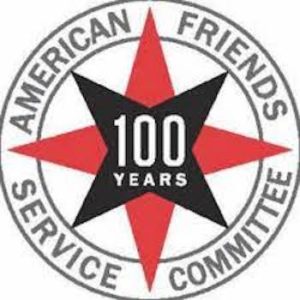
*The American Friends Service Committee (AFSC) was founded on this date in 1917. They are a Quaker Religious Society of Friends, an established organization working for peace and social justice in the United States and worldwide.
AFSC was founded as a combined effort by American members of the Religious Society of Friends to assist World War I civilian victims. It continued to engage in relief action in Europe and the Soviet Union after the Armistice of 1918. Quakers traditionally oppose violence in all its forms, and many refuse to serve in the military, including when drafted. AFSC's original mission grew from the need to provide conscientious objectors (COs) with a constructive alternative to military service. In addition to conducting alternative service programs for COs, AFSC collected relief in food, clothing, and other supplies for displaced persons in France.
Quakers ordered old and made new clothing, grew fruits and vegetables, canned them, and then shipped the materials to France for distribution. After the war's end in 1918, AFSCs began working in Russia, Serbia, and Poland with orphans and the victims of famine and disease, and in Germany and Austria, they set up kitchens to feed hungry children. By the mid-1920s, it focused on improving American racial relations. During the 1930s and through World War II, AFSC helped refugees escape from Nazi Germany, aiding people not supported by other organizations, primarily non-religious Jews and Jews married to non-Jews.
When Japanese Americans were "evacuated" from the West Coast into inland internment camps, the AFSC headed the effort to help college students transfer to Midwest and East Coast schools to avoid centers and worked with Japanese Americans resettling in several cities during and after the war. After the war ended, they did relief and reconstruction work in Europe, Japan, India, and China. In the United States, AFSC supports the American Civil Rights Movement and the rights of African Americans, Native Americans, Mexican Americans, and Asian Americans. As the Cold War developed, it moved to employ more professionals rather than Quaker volunteers, attempting to broaden its appeal and respond more forcefully to racial injustice, women's issues, and demands of sexual minorities for equal treatment.
Also, they work for world peace. In 1947, the AFSC was awarded the Nobel Peace Prize for its efforts to relieve the war. Shortly afterward, the AFSC became one of the first NGOs to be given Consultative Status at the United Nations. The Quaker United Nations Office was established. In 1955, the committee published Speak Truth to Power: A Quaker Search for an Alternative to Violence, drafted by a group that included Bayard Rustin. Focused on the Cold War, the 71-page pamphlet asserted that it sought "to give a practical demonstration of the effectiveness of love in human relations." It was widely commented on in the press, both secular and religious, and proved to be a significant statement of Christian pacifism. In 1963, they collaborated with James Lawson to distribute Martin Luther King's Letter from a Birmingham Jail.
As the Cold War escalated, AFSC was involved in relief and service efforts, often supporting civilians on both sides of conflicts worldwide, including the Korean War, the Hungarian Revolution of 1956, the Algerian War, and the Nigerian-Biafran War. In 1966, AFSC developed programs to help children and provided medical supplies and artificial limbs to civilians in both North Vietnam and South Vietnam. Since the 1970s, AFSC has also worked extensively as part of the peace movement, especially to stop nuclear weapons production and deployment.